Key takeaways:
- Emphasizing vulnerability in mentorship fosters deeper connections and encourages mentees to share their struggles.
- Creating tailored character development plans and celebrating small achievements enhances motivation and personal growth.
- Establishing clear communication and encouraging self-reflection helps overcome common mentoring challenges and promotes independence in mentees.
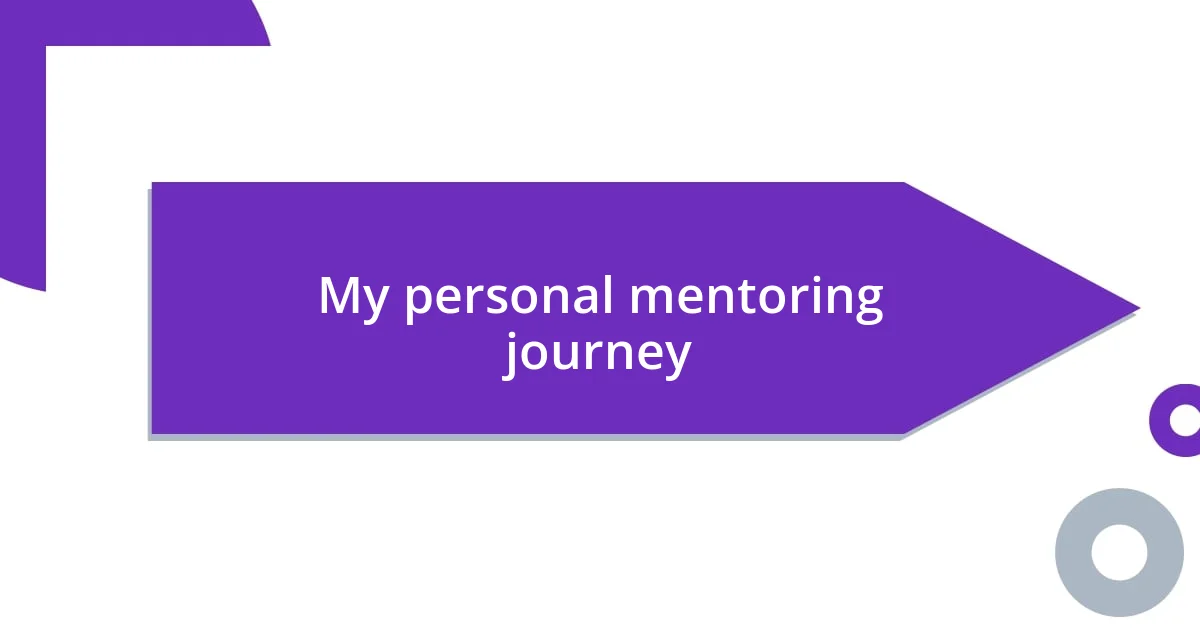
My personal mentoring journey
Reflecting on my personal mentoring journey, I remember the first time I took on a mentee. It felt daunting at first—like stepping into uncharted territory. I often asked myself, “Am I really equipped to guide someone else?” But that feeling transformed as I watched my mentee grow and thrive, igniting a passion for mentorship within me.
One particular experience stands out vividly. A mentee struggled with self-confidence and often doubted their abilities. I’ll never forget the moment when they presented their work to a group for the first time. The look of pride on their face was priceless, and in that instant, I realized the profound impact I could have on someone’s character development. It’s moments like these that remind me why I’m committed to fostering growth in others.
As my mentoring path unfolded, I learned to embrace vulnerability. Sharing my own struggles and failures with my mentees not only deepened our connection but also created a safe space for them to express their fears. I started to wonder—how can we truly inspire growth if we don’t allow ourselves to be seen as imperfect? That question propelled my journey into a more authentic and meaningful experience for both me and my mentees.
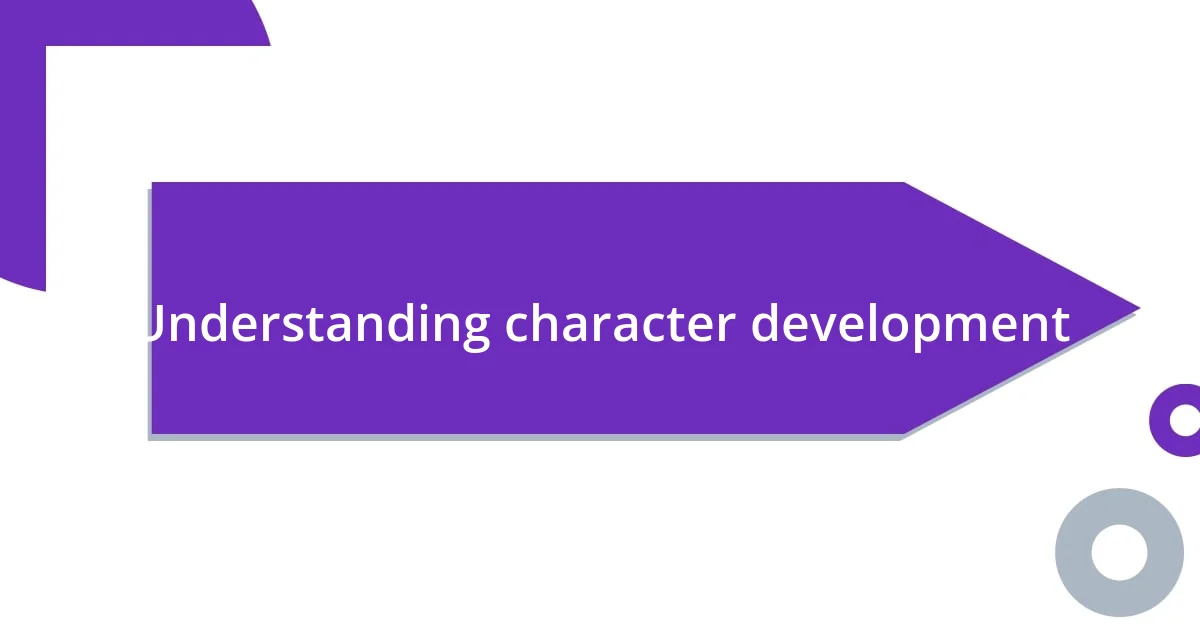
Understanding character development
Understanding character development is an ever-evolving journey. It’s not just about shaping one’s values or beliefs, but also about fostering resilience and emotional intelligence. I remember a time when I helped someone who faced continuous setbacks. We would often discuss how each failure could be reframed as a lesson. Over time, I witnessed a remarkable transformation in their mindset; they learned to embrace challenges rather than fear them.
Character development hinges on the relationship between the mentor and the mentee. In my experience, the most significant growth occurs when trust is established and open dialogue is encouraged. I often share personal stories to create a relatable connection. One mentee told me that my vulnerability inspired them to open up about their own experiences. This mutual exchange forms the foundation for deeper character growth.
The process is ongoing and doesn’t end with a single conversation or milestone. It requires patience, consistency, and empathy. I also emphasize the importance of setting small, achievable goals. I recall guiding a mentee through a succession of minor achievements, which ultimately built their self-esteem. Witnessing this progression in character development has reaffirmed my belief that success is not always about the endgame, but rather about the steps we take along the way.
| Aspects | Significance |
|---|---|
| Resilience | Enables individuals to face and overcome challenges effectively. |
| Emotional Intelligence | Helps in understanding and managing emotions for better relationships. |
| Mutual Trust | A key ingredient in fostering character development between mentor and mentee. |
| Goal Setting | Provides a roadmap for personal growth and instills motivation. |
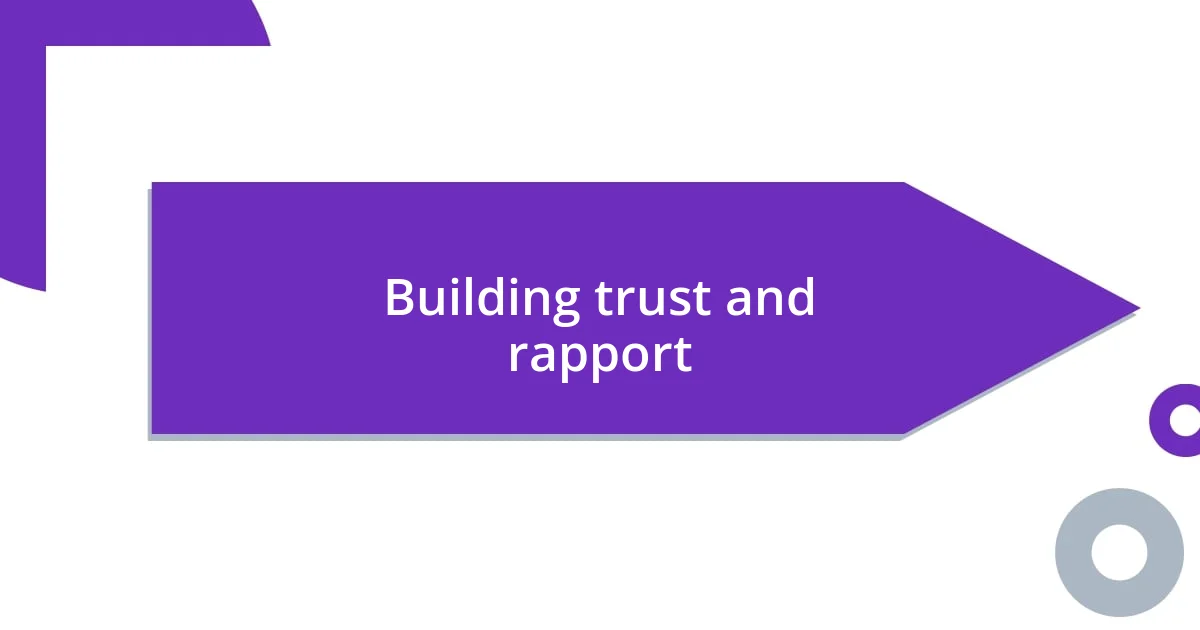
Building trust and rapport
Building trust and rapport is essential in the mentoring relationship. One of the most effective strategies I’ve employed is active listening. I recall a moment when a mentee shared a particularly challenging experience. Instead of jumping in with advice, I took a step back and let them express their thoughts and feelings fully. This not only made them feel valued but also laid the groundwork for a deeper connection. When a mentee senses that they’re being heard, it significantly enhances their willingness to share—and grow.
Here are some key ingredients for building trust and rapport in mentorship:
- Open Communication: Encourage honesty and transparency, making it easy for mentees to share their thoughts and concerns.
- Consistency: Be reliable in your interactions. Regular check-ins can help create a sense of security.
- Empathy: Show genuine understanding of their struggles and challenges. It bridges gaps and fosters alignment.
- Mutual Respect: Treating each other as equals promotes a feeling of partnership in the mentoring experience.
- Validation: Acknowledge their feelings and experiences to reinforce their worth and importance in the process.
In my experience, embracing these elements has not only strengthened my relationships with mentees but also deepened my understanding of what it means to be truly present in each moment of mentorship. It’s a journey I treasure and take to heart.
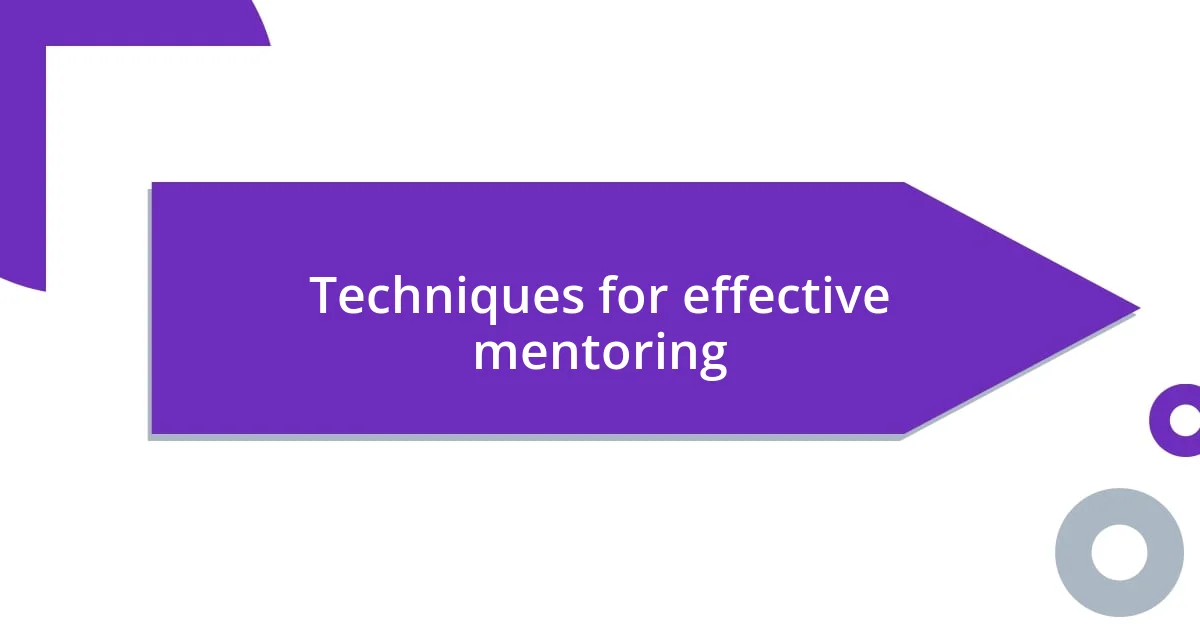
Techniques for effective mentoring
One technique I find invaluable in effective mentoring is tailoring my approach to each mentee’s unique personality and situation. For instance, with one mentee, I noticed they thrived on creative discussions, so I incorporated storytelling into our sessions. By framing lessons within relatable narratives, their engagement soared, and they began to think critically about their experiences. Have you ever considered how storytelling can open doors to deeper understanding? It’s a powerful vehicle for connection.
Another strategy involves encouraging self-reflection. After discussing a challenging topic, I often ask open-ended questions, inviting my mentees to explore their thoughts more deeply. I remember asking a mentee, “What did you learn about yourself in that situation?” The pause that followed was telling—it allowed them to truly examine their emotions. This not only promotes growth but also enhances their emotional intelligence, fostering resilience along the way.
Lastly, I emphasize the importance of celebrating progress, no matter how small. When a mentee reaches a goal, I make it a point to recognize their effort with enthusiasm. Once, after a mentee completed a tough project, we held a mini-celebration. Their pride was evident, and in that moment, I saw how validation could spark further motivation. Isn’t it amazing how a little acknowledgment can propel someone forward? Each technique I use is rooted in creating a space where mentees feel empowered to flourish.
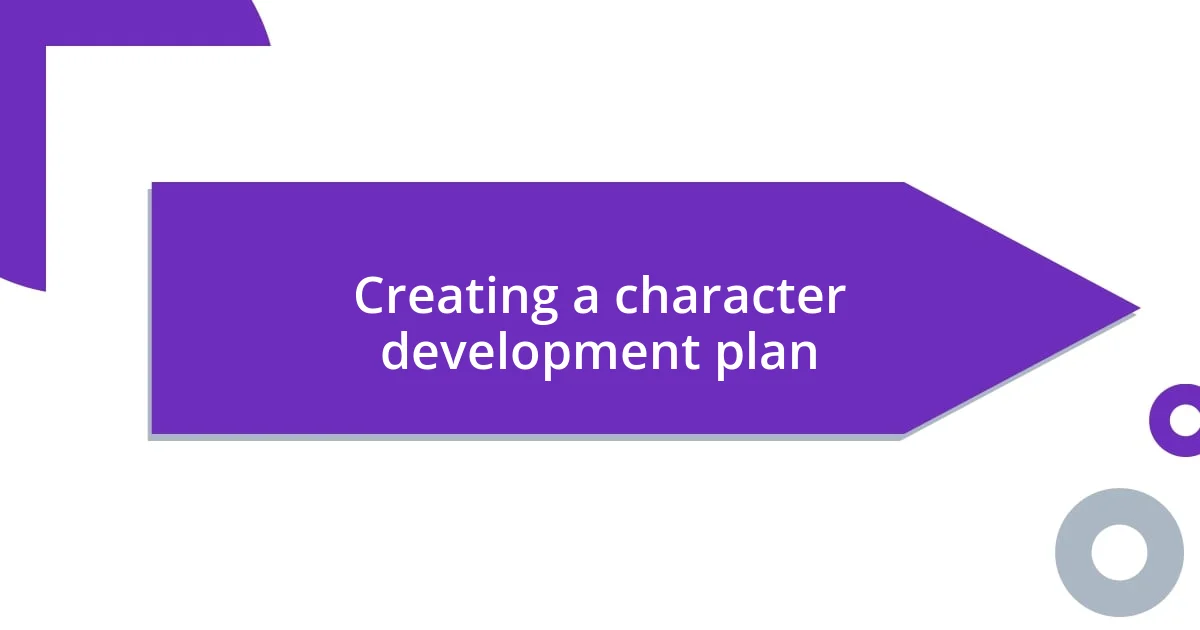
Creating a character development plan
Creating a character development plan is all about setting clear, achievable goals that guide growth. I remember once sitting down with a mentee who felt lost in their journey. Together, we mapped out a plan that focused on three core traits they wanted to develop: resilience, empathy, and confidence. By breaking these down into actionable steps, we transformed abstract concepts into tangible practices, making the process less daunting.
Regularly revisiting the character development plan is crucial. I typically set monthly check-ins to reflect on progress, which not only keeps the momentum going but also fosters accountability. One of my mentees once said, “I didn’t realize how far I’d come until we reviewed my goals together.” That realization often ignites a renewed sense of purpose and motivation. Isn’t it rewarding to witness that spark in someone else?
Moreover, I find it essential to adapt the plan as needed. Life throws curveballs, and what works initially might need a tweak down the line. In one instance, a mentee faced unforeseen obstacles that shifted their priorities. Instead of sticking rigidly to our original plan, we embraced flexibility, allowing them to revise their goals. That approach not only alleviated their stress but also reinforced the idea that growth isn’t linear; it’s a dynamic journey. Wouldn’t you agree that adaptability is key to truly flourishing in character development?
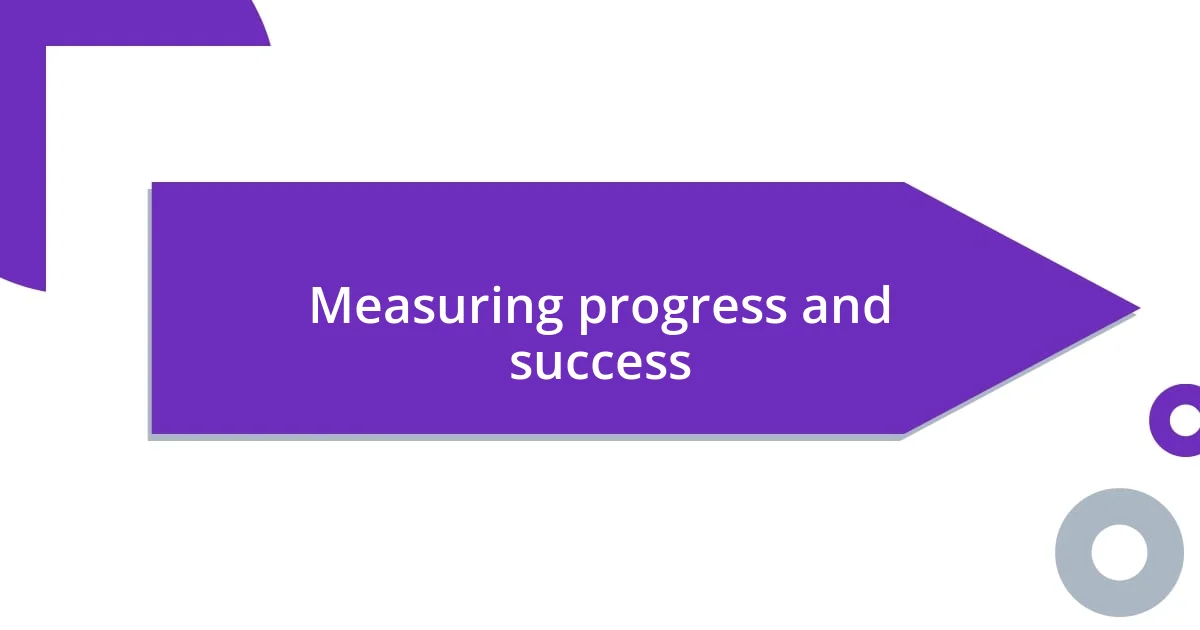
Measuring progress and success
Measuring progress and success in character development can feel both exciting and challenging. I recall a moment when I decided to implement a simple yet effective metric: a journaling exercise. Each mentee was encouraged to document their thoughts and growth. One mentee remarked on how reviewing past entries showed them the shifts in their mindset over time. Isn’t it incredible how tangible reflections can highlight growth that may otherwise go unnoticed?
Another effective method is utilizing feedback loops. During our sessions, I regularly ask my mentees to assess their own progress alongside my observations. I remember one particularly insightful conversation where a mentee shared, “I wasn’t aware of how much I had grown until I compared my past experiences to recent challenges.” This self-assessment not only builds their confidence but also empowers them to take ownership of their journey. Don’t you find that collaborative reflection can deepen understanding immensely?
I also integrate visual progress markers, like charts or lists, to track accomplishments and set future goals. After introducing this concept to one mentee, they created a visual board highlighting their milestones. Seeing their achievements laid out visibly sparked genuine joy. It’s fascinating how such a simple tool can serve as a powerful reminder of one’s journey. Could investing a little creative energy into progress measurement be the key to unlocking potential?
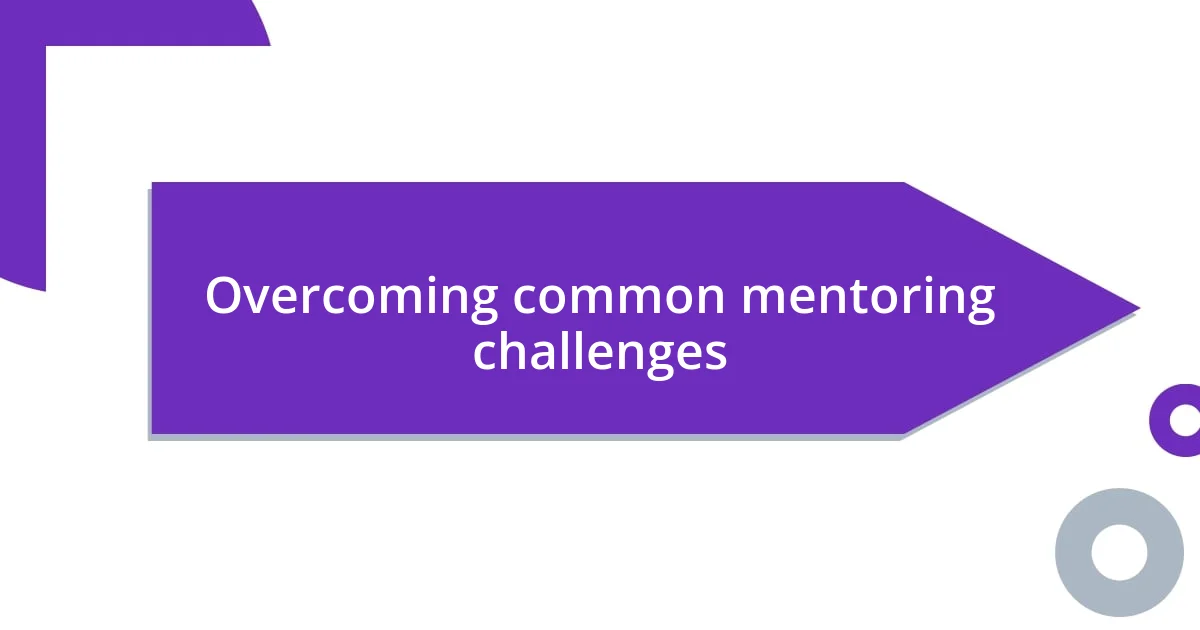
Overcoming common mentoring challenges
One of the most common hurdles in mentoring is miscommunication. I recall an instance where a mentee and I had different expectations for our meetings, leading to frustration on both sides. After a candid conversation, we established clear communication norms, like sharing goals before sessions. This not only clarified our understanding but also built a stronger relationship. Isn’t it amazing how a little dialogue can enhance mutual understanding?
Another challenge is the fear of vulnerability. I’ve seen mentees hesitate to share their struggles, worried about being judged. I always prioritize creating a safe space by sharing my own challenges first. In one memorable conversation, I disclosed a setback I faced early in my career. My mentee’s eyes widened, and that openness sparked a heartfelt exchange where they finally felt comfortable sharing their obstacles. Do you think that vulnerability can be the catalyst for deeper connections in mentorship?
Lastly, there’s the difficulty of balancing guidance and independence. I once had a mentee who was overly reliant on my input for every decision. Recognizing this, I started asking open-ended questions instead of providing solutions right away. This shift took time, but it encouraged them to think critically and develop their problem-solving skills. Watching them gain confidence in their abilities was incredibly rewarding. Wouldn’t you agree that fostering independence in a mentee’s journey is essential for their long-term growth?














